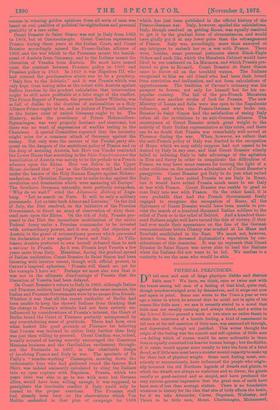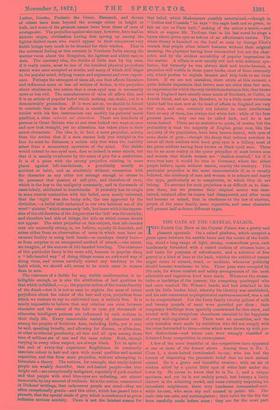PHYSICAL PREJUDICES.
DO tall men and men of large physique dislike and distrust little men ? We have, we think, once or twice met with the traces among tall men of a feeling of that kind, quite real, though unacknowledged even by themselves, and it crops out now and again in print. Some one wrote to the Times a year or two ago a letter in which he avowed that he could not in spite of his reason like little men ; we saw it recently stated in a novel that little men are usually cunning and always timid, and a writer in the Liberal Review penned a week or two since an entire thesis in which the existence of a hostile feeling, a kind of resentment in tall men at the self-assertion of little men, was assumed all through, and deprecated, though not justified. This writer thought the origin of the feeling was the conceit and self-opinion of little men —a failing which of course would be more noticeable in them than in equally conceited but heavier human beings ; but the dislike, if it exists, would appear more usually to take the form of a faint dread, as if little men must have a sinister mental capacity to make up for their lack of physical weight. Some such feeling must, con- sciously or unconsciously, have influenced the people who origin- ally invented the old Northern legends of dwarfs and giants, in which the dwarfs are always so malicious and so clever, the giants usually so good-natured and so stupid, and have produced the very curious general impression that the great men of earth have been men of less than average stature. There is no foundation whatever in history for the idea that size of body affects the brain, for if we take Alexander, Cmsar, Napoleon, Wellesley, and Thiers to be little men, Moses, Charlemagne, Mohammed, Luther, Goethe, Frederic the Great, Bismarck, and dozens of others have been beyond the average either in height or bulk, and some of the greatest names have been those of men of average size. The prejudice against size may, however, have had an historic origin, civilisation having first sprung up among the lighter-limbed races, who would appear to their conquerors very feeble beings very much to be dreaded for their wisdom. That is the universal feeling at this moment in Northern India among the warrior races about the Bengalees, the lightest and ablest race in Asia. The contrary idea, the dislike of little men by big ones, if it really exists, must be one of the hundred physical prejudices which were once accepted as truths, and many of which still linger in the popular mind, defying reason and argument and even experi- ence. Perhaps the strongest of them all, one that affects literature and influences more or less all writers of fiction, is the prejudice about strabismus, the notion that a cross-eyed man is necessarily more or less evil. The manufacturers of tales all affirm this, and it is an article of popular belief which nothing can shake, yet it is demonstrably groundless. If it were not so, we should be forced to conclude that as the affection is curable by an operation, an oculist with his fine instruments can modify his patients' moral qualities, a clear reductio ad absurdum. There are hundreds of persons in Great Britain who at one time looked two ways at once and now look straight, yet no alteration has taken place in their moral characters. The idea is, in fact, a mere prejudice, arising from the notion that if a man cannot look you straight in the face he must be dishonest, a notion only true when the inability arises from a momentary operation of the mind. The dislike would extend to one-eyed men, does so indeed in some minds, but that it is usually overborne by the sense of pity for a misfortune. It is of a piece with the strong prejudice existing in some places against left-handedness, a peculiarity usually an accident or habit, and as absolutely without connection with the character as any other not strange enough to arouse in its possessor that passion of self-pity, and therefore of envy, which is the key to the malignity constantly, and in thousands of cases falsely, attributed to hunchbacks. It probably has its origin in some remote connection with the belief, once nearly universal, that the ' right ' was the lucky side, the one approved by the divinities,—a belief still embalmed in our own habitual use of the word "sinister," which means only left,' but bears with it the impres- sion of the old doctrine of the Augurs that the left' was the unlucky, and therefore bad side of things, the side on which omens should not appear. The other prejudice on this subject, that left-handed men are unusually strong, is, we believe, equally ill-founded, and arises either from an observation of cases in which men have an unusual facility in using both hands—as monkeys clearly have— or from surprise at an unexpected method of attack,—the secret, we imagine, of the success of left-handed bowling. The existence of this particular fancy is the more odd, because in popular slang a "left-handed way" of doing things means an awkward way of doing them, and nurses carefully correct any tendency to the habit which, we should add, seems to be much rarer in women than in men.
The existence of a dislike for any visible malformation is in- telligible enough, as is also the attribution of bad qualities to that which is dislikec1,—e.g., the popular notion of the innate ferocity of the dumb—but it is not so easy to explain the mass of latent prejudices about the colour of the hair and eyes, prejudices from which we venture to say no cultivated man is entirely free. It is nearly impossible to believe that any relation can exist between character and the colour of the hair or eyes, yet thousands of otherwise intelligent persons are influenced by such notions in their daily life. Every conceivable variety of character exists among the peoples of Southern Asia, including India, yet it may be said, speaking broadly, and allowing for disease, or albinoism, or other accidental peculiarity, all hair and all eyes among those tens of millions are of one and the same colour. Both, though varying in every other respect, are always black. Yet in spite of this and of every-day experience Englishmen do constantly associate colour in hair and eyes with moral qualities and mental capacities, and this from mere prejudice, without attempting to formulate a theory. The notions, for example, that sandy-haired people are weakly deceitful, that red-haired people—the true bright red—are exceptionally malignant, especially if pock-marked and that people with steel blue-eyes are unfeeling, are almost immovable by any amount of evidence. So is the notion, consecrated in Dickens' writings, that cadaverous people are cruel—they are often exceptionally gentle—and this other, which has passed into a proverb, that the special shade of grey which is condemned as green indicates envious acerbity. There is not the faintest reason for ' that belief, which Shakespeare possibly entertained,—though in "Troilus and Cressida" he says "the eagle hath not so green, so fair an eye as Paris hath," making of the colour a merit,—and which so angers Mr. Trollope that in his last novel he sings a hymn about green eyes as tokens of an affectionate nature. The whole theory is knocked on the head at once by George Eliot's remark that people often inherit features without their original meaning, the physique having been transmitted but not the char- acter, and by the evident mutability of popular impressions in the matter. A villain is now usually red and with deficient eye- lashes, but formerly he was always dark and beetle-browed, a prejudice still visible in those queer books, most of them extremely old, which profess to explain dreams and help fools to see their future. If we are not mistaken, there exists at this moment a quite definite impression that brown men are abler than fair men, an impression for which the only visiblefoundationis this, that brown men in England have usually some touch of Southern, or Celtic, or Jewish blood, and are apt, therefore, to be a little more vivacious Quite half the men now at the head of affairs in England are very fair men, and one, certainly not inferior in mere intellectual force to any of them, has always had white hair ; while of the four greatest poets, only one can be called dark, and he is not raven-haired. There are no statistics to quote, of course, but the probability is -that the majority of English great men, like the majority of the population, have been brown-haired, with eyes of some shade of grey,—though the fancy that induces novelists to invest all their soldiers with keen grey eyes is a fallacy, most of the great soldiers having been brown or black-eyed men. There can be no more reality in the queer prejudice of most brown men and women that blonde women are "shallow-hearted," for if it were true here it would be true in Germany, where the ablest people believe, again without reason, exactly the contrary. 'This particular prejudice is the more unaccountable if, as is usually believed, the tendency of men and women is to admire and marry the type, particularly as to complexion, to which they do not belong. To account for such prejudices is as difficult as to dissi- pate them, but we presume their original source was race- hatred, retained after its reason had disappeared, and after races had become so mixed, that in obedience to the law of atavism, people of the same family, same capacities, and same character will present half-a-dozen different types.



































 Previous page
Previous page